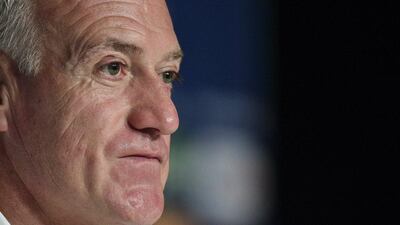Euro 2016 semi-finals, France v Germany, Thursday 11pm
One of the official French broadcasters of Euro 2016 has a special gimmick for their coverage of the tournament, used when the national team are in action and they, the M6 channel, have the rights to the match.
The device is a hologram, which transports the manager of France, Didier Deschamps, into the studio for a post-match question-and-answer session.
In reality, Deschamps is microphoned up, looking into a camera in an ante-chamber near the dressing-room. On screen, his virtual image is in Paris face to face with the smooth presenter-cum-pundit, the ex-player David Ginola.
Deschamps appears, teleported, looking slightly fuzzy, and sometimes glancing in wrong direction. But it’s a neat device.
• Richard Jolly: Depleted Germany confident they'll be fit enough for France
Not much is ever revealed in the exchanges. Deschamps is guarded but urbane. Post-match, he’s mostly been in the comfortable position of looking back over a win or a draw – France are unbeaten in their five games so far – but has been obliged, after all but the Iceland last-16 tie, to acknowledge that his work needed further finessing as France endured some sluggish periods.
The remote Deschamps will take questions on Thursday night looking either relieved or crestfallen.
The world champions Germany, the opponents at the Stade Velodrome, make for a challenge a good deal more muscular than Iceland, Republic of Ireland, Albania, Romania or the Swiss, who have lined the route to the semi-final. The remote Deschamps may look a little more vulnerable, too. Those who know him have talked of the pressures he feels, but keeps masked, and how he has seemed ... well, rather remote, distant, in the course of the last four weeks.
It is no wonder. Deschamps was under siege in the lead-up to the tournament. There were the barbs arrowed in his direction by Eric Cantona, a playing contemporary of his and Ginola’s, and Karim Benzema, the centre-forward he excluded from the squad.
Both of them made references to Deschamps “bowing to the racist part” of France in not selecting Benzema, who had been under police investigation linked to an alleged blackmail attempt, and Cantona extended his speculative, groundless criticism to the fact that Hatem Ben Arfa, who like Benzema, has a North African background, was not in the squad.
This was an inflammatory issue, unwelcome on the eve of a major competition. Deschamps had to deal with plenty of other unforeseen traps, too, like a rash of injuries that removed key men from his plans.
He had to dig deep.
“He’s a coach who has a great deal of underlying strength,” said Steve Mandanda, France’s second choice goalkeeper and a long-time Deschamps ally: they were coach and senior player at Marseille during the title-winning season of 2009/10. “He knows this group very well.”
He has had four years to build for this challenge – Euro 2016 was always Deschamps’ priority when he took over in the summer of 2012 – yet there has been a need to improvise, to think on his feet.
Fact is that perhaps only five players from the starting line-up when France lost 1-0 to Germany in the quarter-final of the 2014 World Cup will line-up against Germany. Injuries and other absences – like Benzema’s – explain some of that.
The recent evolution of a Plan B, better than the original Plan A, is another factor.
France began the tournament apparently settled on a 4-3-3 formation, with Antoine Griezmann and Dmitri Payet on the flanks. But lined up in an alternative scheme, 4-2-3-1, as they have been for a little over two hours of football so far, France have scored eight of their 11 goals. The other three hours have yielded three. With Griezmann more central, in a 4-2-3-1, France produced their most emphatic football, in the second half against Ireland, and in the 5-2 win over Iceland.
The players are said to have lobbied for that system.
“He’s a coach who likes to have dialogue with his players,” says Patrice Evra, the most experienced member of the squad. “But there is only one boss, and that’s him.”
France would anticipate needing their most authoritative showing yet to emerge victorious against Germany. And DD, as the coach is known, may need to be daring.
Follow us on Twitter @NatSportUAE
Like us on Facebook at facebook.com/TheNationalSport


